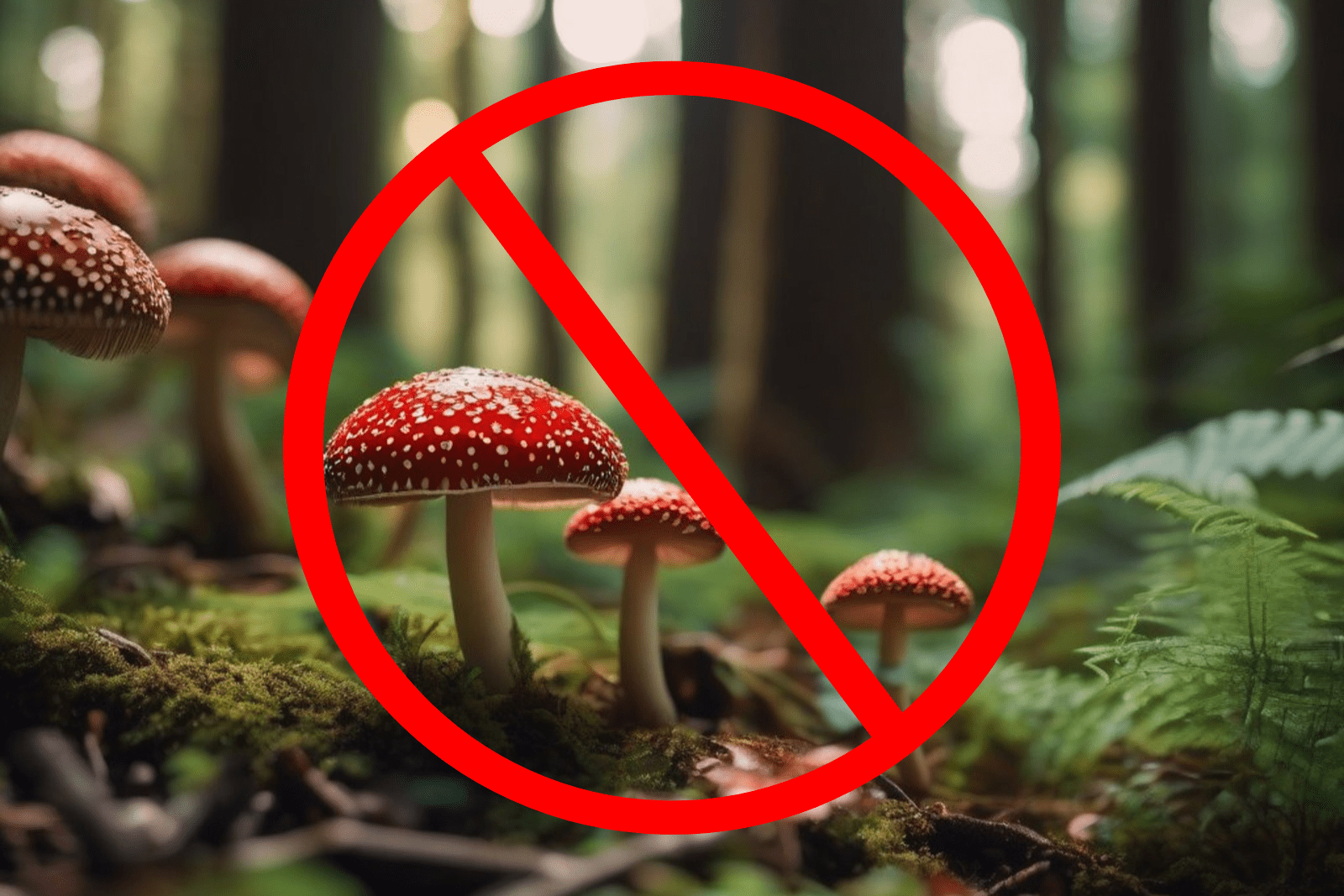Substances | 4 min read
Can You Overdose on Mushrooms? Understand The Effects and Health Risks
Medically Reviewed By

On January 22, 2024
Written By
On January 22, 2024

What you will learn
- Mushrooms influence how you process serotonin and temporarily alter mood, thoughts, and perceptions, and can result in hallucinations.
- The effects of magic mushrooms, or psilocybin, begin within 30 minutes and can last for up to six hours.
- Psilocybin is a Schedule I controlled substance which means it carries a high potential for abuse and has not confirmed medical application.
- Consuming a large number of mushrooms can lead to severe psychological distress, a 'bad trip,' intense fear or anxiety, and can result in harmful behaviors or accidents.
Psilocybin mushrooms, or magic mushrooms, are naturally occurring fungi that contain psilocybin compounds that can be consumed for their hallucinogenic effects. Mushrooms influence the way your brain processes serotonin to temporarily alter a person’s mood, thoughts, and perceptions, which can include hallucinations, changes in mood, and altered thinking patterns.[1,2]
The effects of mushrooms typically begin within 30 minutes of being taken and can last for up to six hours.[3] Your experience with mushrooms can vary in several ways and depend upon several factors, including your individual tolerance, current mindset and environment, and your unique physiological makeup.
While the use of magic mushrooms is not commonly associated with fatal overdoses, there are significant risks, including the potential for poisoning, particularly if misidentified species are consumed, psychological distress, and exacerbation of pre-existing mental health conditions.
Is It Safe to Take Mushrooms?
Although magic mushrooms are naturally occurring, there is no currently accepted safe dosage for psilocybin—or any drug of potential abuse.[4] The usage of any drug always carries risks, and magic mushrooms are no exception.
According to the 2015 National Survey on Drug Use and Health, 8.5% of people in the U.S. had used psilocybin at some point in their life.[5] There are also currently several studies underway to explore the therapeutic potential of psilocybin as a tool for combatting the symptoms of several mental health disorders, but there is a continuing need for further research and more information as to its benefits in this regard.[6]
Psilocybin is currently listed as a Schedule I substance per the Controlled Substances Act,[7] meaning that it carries a high potential for abuse with no accepted safety standards nor medical uses in treatment on the federal level, though ongoing research is examining its potential therapeutic uses. Its legality can vary by jurisdiction regarding its use as a therapeutic tool.
What Are the Common Effects of Mushrooms?
After consuming mushrooms, you may experience:
- A sense of euphoria
- Changes in consciousness, mood, thought, and perception
- An increase in introspection
- Dilated pupils
- Visual and/or auditory hallucinations
- Nausea
- Headaches (that sometimes last for up to a day after usage)
- Irregular heartbeat
- Sweating
- Chills
It’s also important to emphasize that several different experiences are possible, as your environment, personality, and body chemistry can all affect the experience.
Is It Possible to Overdose on Mushrooms?
The concept of overdosing on magic mushrooms takes on a different quality when compared to traditional pharmaceutical substances or other illicit drugs. Consuming a large quantity of mushrooms containing psilocybin can lead to severe psychological distress, characterized by a ‘bad trip’ with intense fear or anxiety, and in rare cases, can result in harmful behaviors or accidents. Additionally, there is a risk of consuming toxic varieties of mushrooms mistaken for psilocybin-containing ones, which can have fatal physical consequences.
Furthermore, you may accidentally place yourself at risk if you are under the influence of mushrooms in circumstances that are dangerous or in which your altered state may lead to increased risk.
Are There Any Long-Term Effects of Taking Mushrooms?
Research into the long-term effects of psilocybin-containing mushrooms is still in its infancy. Some studies suggest that controlled and guided use of these substances might have therapeutic potential, particularly in addressing depression, anxiety, and post-traumatic stress disorder (PTSD). However, more research is needed to understand the full potential risks and benefits of psilocybin.
Is It Possible to Get Addicted to Mushrooms?
Unlike substances that lead to physical dependence, mushrooms containing psilocybin are not considered physically addictive, as users do not typically develop a physical reliance on these mushrooms. However, there’s a possibility of developing a psychological dependence on mushrooms, where you may begin to seek out these experiences excessively.
According to the Diagnostic and Statistical Manual of Mental Disorders, 5th edition (DSM-5), a person can be diagnosed with other hallucinogen use disorder if they meet at least two of the following criteria:[8]
- The hallucinogen is taken in larger amounts or over a longer period than was initially intended.
- There is a persistent desire and/or unsuccessful efforts to cut down or control psilocybin use.
- A great deal of time is spent in activities necessary to obtain, use, or recover from psilocybin.
- Cravings to use psilocybin.
- Recurring psilocybin use leads to difficulties fulfilling obligations at home, work, or school.
- There is a pattern of continued psilocybin use despite the continual problems caused or aggravated by the drug’s effects (for example, arguing with a loved one about the consequences of using psilocybin).
- Important social, occupational, or recreational activities are reduced or given up entirely because of psilocybin use.
- Recurrent psilocybin use in situations in which it is physically hazardous (such as while driving).
- Psilocybin use is continued despite knowledge of a persistent or recurrent physical or psychological issue likely to have been caused or exacerbated by the drug.
- Tolerance, as defined by either of the following: There is a need for increased amounts of psilocybin to achieve the desired effect or there is a measurably diminished effect with continued use of the same amount of psilocybin.
Since no physical symptoms of withdrawal are established for psilocybin, this criteria is not included as it is for other substance use disorders.
What if I Combine Mushrooms With Other Substances?
Combining psilocybin mushrooms with other substances, whether they be legal or illicit, can result in several unpredictable interactions. The effects of both substances may be intensified, leading to heightened experiences that might become overwhelming. Mixing psilocybin with other substances can lead to increased anxiety, paranoia, or even other medical complications.
Alcohol and Mushrooms
Combining alcohol and mushrooms can be a risky proposition. Alcohol intensifies the psychological effects of psilocybin, potentially leading to heightened emotional volatility and decreased control over your experience. Moreover, alcohol’s dehydrating effects can worsen the physical toll of a hallucinogenic experience, leading to potential medical complications.
Cannabis and Mushrooms
Cannabis is another substance that some individuals may look to combine with psilocybin mushrooms to enhance their experience. However, as with alcohol, the combination of cannabis and mushrooms can amplify the intensity of the experience significantly. Such combined effects might lead to distortions of reality, increased sensory alterations, and becoming overwhelmed by the experience.
You are Not Alone
You are not alone. If you’re struggling with mushrooms or other substance use issues, our team of compassionate and trained medical professionals is here to help you learn new skills and begin the recovery process. We offer a comprehensive outpatient program designed to provide the support you need while allowing you to maintain your day-to-day responsibilities. If you or a loved one is struggling with addiction, contact us today to start healing.
Frequently Asked Questions About Mushrooms and An Overdose on Mushrooms
Psychedelics are in the same classification as hallucinogens and are psychoactive substances that produce mind-altering effects.
While some alternative applications are being explored, there is no currently accepted safe dosage for psilocybin at this time.
There are a number of ways to pay for necessary substance use treatment. From private pay and insurance to Medicaid and Medicare. To verify your coverage and determine what amount, if any, must be paid out of pocket, see here.
Ascendant New York Editorial Guidelines
Here at Ascendant New York, we understand the importance of having access to accurate medical information you can trust, especially when you or a loved one is suffering from addiction. Find out more on our policy.
[1] Abuse, N. I. on D. (2023, April). Psychedelic and Dissociative Drugs. National Institute on Drug Abuse. https://nida.nih.gov/research-topics/psychedelic-dissociative-drugs#what-are on August 25th, 2023
[2] Alcohol and Drug Foundation. (2020, October 7). ADF – Drug Facts – Magic Mushrooms, Psilocybin. ADF – Alcohol & Drug Foundation. https://adf.org.au/drug-facts/psilocybin/ on August 25th, 2023
[3] Psilocybin and magic mushrooms: Effects and risks. (n.d.). Www.medicalnewstoday.com. https://www.medicalnewstoday.com/articles/308850#what-is-psilocybin on August 25th, 2023
[4] Alcohol and Drug Foundation. (2020, October 7). ADF – Drug Facts – Magic Mushrooms, Psilocybin. ADF – Alcohol & Drug Foundation. https://adf.org.au/drug-facts/psilocybin/ on August 25th, 2023
[5] Johnson, M. W., Griffiths, R. R., Hendricks, P. S., & Henningfield, J. E. (2018). The abuse potential of medical psilocybin according to the 8 factors of the Controlled Substances Act. Neuropharmacology, 142(142), 143–166. https://doi.org/10.1016/j.neuropharm.2018.05.012 on August 25th, 2023
[6] Johns Hopkins Center for Psychedelic and Consciousness Research. (n.d.). Www.hopkinsmedicine.org. https://www.hopkinsmedicine.org/psychiatry/research/psychedelics-research on August 25th, 2023
[7] WHAT IS PSILOCYBIN? WHAT IS ITS ORIGIN? What are common street names? What does it look like? How is it abused? What is its effect on the body? What is its effect on the mind? (2020). https://www.dea.gov/sites/default/files/2020-06/Psilocybin-2020_0.pdf on August 25th, 2023
[8] Hallucinogen-Related Disorders | Johns Hopkins Psychiatry Guide. (n.d.). Www.hopkinsguides.com. https://www.hopkinsguides.com/hopkins/view/Johns_Hopkins_Psychiatry_Guide/787099/all/Hallucinogen_Related_Disorders on August 25th, 2023




